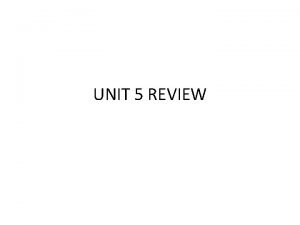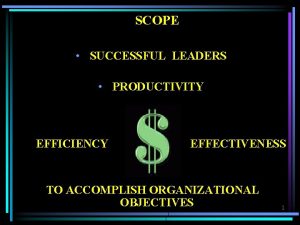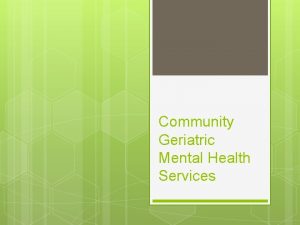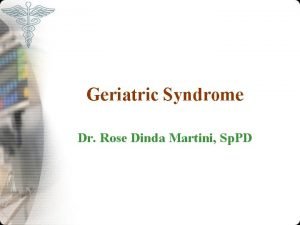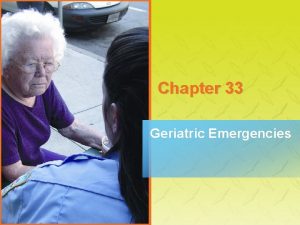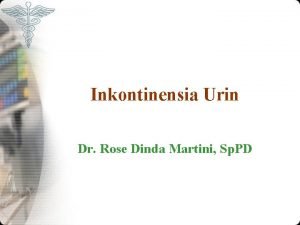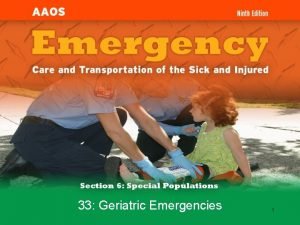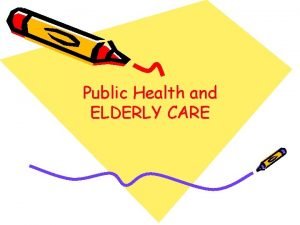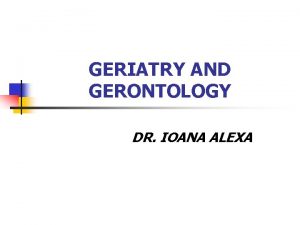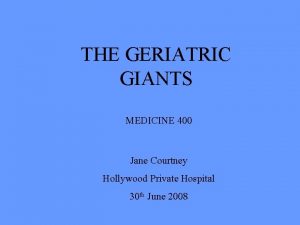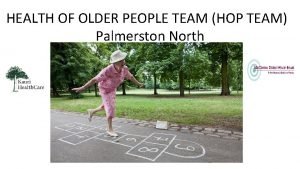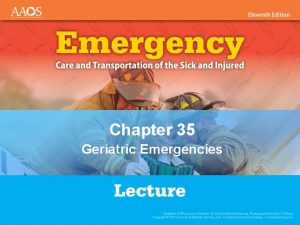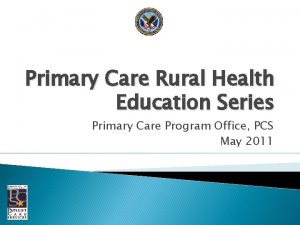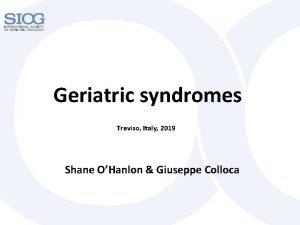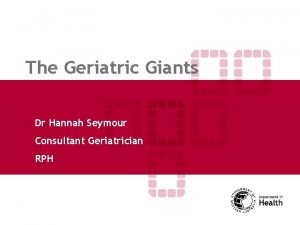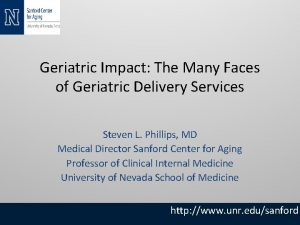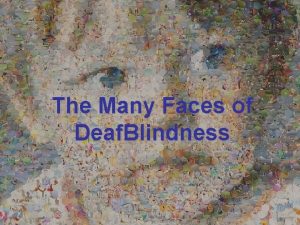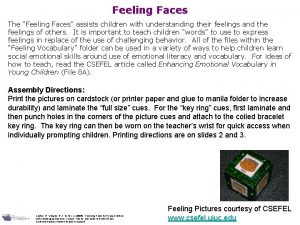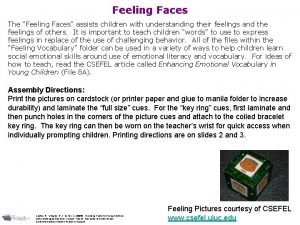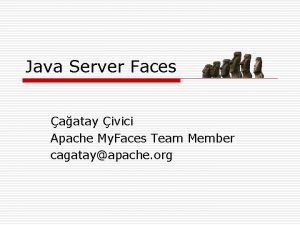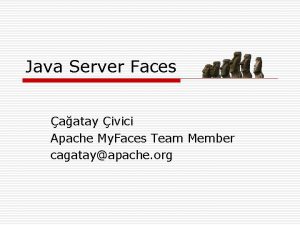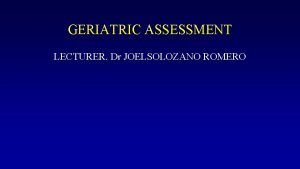Geriatric Impact The Many Faces of Geriatric Delivery



































- Slides: 35

Geriatric Impact: The Many Faces of Geriatric Delivery Services Steven L. Phillips, MD Medical Director Sanford Center for Aging Professor of Clinical Internal Medicine University of Nevada School of Medicine http: //www. unr. edu/sanford

Medicare Annual Wellness Visit Established in 2010 through the Affordable Care Act, this benefit was designed to encourage monitoring of physical and cognitive abilities, as well as development of plans associated with decreasing the impact of increasing frailty on everyday life for elders. Several of the chronic conditions experienced by elders are typically not of acute onset. These conditions often display minor symptoms at earlier stages that may be missed if not specifically screened for.

Health Risk Assessment Key Elements • Demographic data • Self-Assessment of health • Psychological risk and risk factors • Behavioral risks • Activities of Daily Living (ADLs) • Instrumental Activities of Daily Living (IADLs) • Assessment of medical history (including familial risk factors) • Psychological screenings (depression, etc. ) • Frailty assessment/ Functional Capacity • Assessment of fall risk including home safety • Cognitive assessment (direct observation and caregiver report) • Advanced care preferences

Closing Gaps in Care • Review chronic conditions • Update immunizations • Personalized care plan • Highlight preventative services • Medication reconciliation • Identify in-home care needs • Advanced directive/ POLST update • Specialty referral as needed

Geriatric conditions such as functional impairment and dementia are common and frequently unrecognized or inadequately addressed in older adults. Early identification of geriatric conditions by performing screening can help clinicians manage these conditions and prevent or delay their complications.

Geriatric Assessment and Screening Tools • • • Frailty Index PHQ 9 Mini Cog Test Nutrition Assessment Activities of Daily Living Instrumental Activities of Daily Living

Dementia: Defined Dementia is a condition that includes a wide range of symptoms linked to declining memory or thinking skills. Symptoms are severe enough to interfere with daily living and worsen over time.

The United States Preventive Services Task Force (USPSTF) concluded there is not enough data to recommend for or against screening. However, the Affordable Care Act of 2010 calls for screening as part of the annual wellness visit for Medicare patients. The International Association of Gerontology and Geriatrics (IAGG) recently published a consensus recommendation for cognitive screening.

Dementia Risk Factors • • Age > 65 Alcohol abuse Head trauma Diabetes Tobacco abuse Depression Never married • • • Increased cholesterol Hypertension Downs syndrome Physical frailty Low education level Low social support

Possible Factors that Reduce Risk of Dementia • • • Adequate folate intake Diet rich in fruits and vegetables Physical activity Stimulating mental activity Mediterranean diet High education level Low or moderate alcohol intake Adequate omega-3 fatty acid Low saturated fat intake

The Mini Cog Administration 1. Instruct the patient to listen carefully to and remember three unrelated words and then to repeat the words. 2. Instruct the patient to draw the face of a clock, either on a blank sheet of paper or on a sheet with the clock circle already drawn on the page. After the patient puts the numbers on the clock face, ask him/her to draw the hands of the clock to read a specific time. (CDT) 3. Ask the patient to repeat the three previously stated words.

The Mini Cog (continued) Scoring • Give 1 point for each recalled word after the CDT distractor. • Patients recalling none of the three words are classified as demented (Score = 0) • Patients recalling all three words are classified as nondemented (Score = 3) • Patients with intermediate word recall of 1 -2 words are classified based on the CDT • (Abnormal = demented; Normal = non-demented) • Note: The CDT is considered normal if all the numbers are present in the correct sequence and position; and the hands readably display the requested time.

Diagnostic Workup • Behavioral/Psychological review • Activities Daily Living • Comprehensive metabolic panel • Complete blood count • B 12 and Folate levels • Thyroid stimulating hormone • • • Clinical history Medication review Neurological Exam Assess cognitive function Neuroimaging (Structural vs Functional).

Main Causes of Depression • • • Past Abuse Conflict Death or a Loss Genetics Substance Abuse • • • Major Events Social Isolation Rejection Medications Chronic Illness

Chronic Illnesses That May Cause Depression • • • Diabetes Mellitus COPD/Emphysema HIV/AIDS Multiple Sclerosis Cancer • • • Heart Disease Arthritis Systemic Lupus Hypothyroidism CVA/Stroke

Impact of Depression • • • Social Isolation Functional Decline Loss of Productivity Self Neglect Danger to Self or Others • • • Increase Office Visits Increase ER Visits Increase Hospitalizations Increase Readmissions Increase Mortality

Screening for Depression Over the last 2 weeks, how often have you bothered by any of the following problems? (circle your answer): Not at all Several Days More than Half Days Every Day 0 1 2 3 1. Little interest in doing things 0 1 2 3 2. Feeling down, depressed, or hopeless 0 1 2 3 3. Trouble falling or staying asleep, or sleeping too much 0 1 2 3 4. Feeling tired or having little energy 0 1 2 3 5. Poor appetite or overeating 0 1 2 3 6. Feeling bad about yourself-or that you are a failure or have let yourself or your family down 0 1 2 3 7. Trouble concentrating on things, such as reading the newspaper or watching television. 0 1 2 3 8. Moving or speaking so slowly that other people could have noticed? Or the opposite-being so fidgety that you have been moving around a lot more than usual 0 1 2 3 9. Thoughts that you would be better off dead or hurting yourself in some way • • If you checked off any problems, how difficult have these problems made it for you to do your work, take care of things at home, or get along with other people? Not difficult at all Somewhat difficult Very difficult Extremely difficult

Chronic Care Management One of the greatest challenges facing elders is the increase in the number of chronic conditions as they age. Chronic conditions can stem from a range of causes and often impact an individual’s quality of life and experiences.

The Centers for Medicare and Medicaid Services (CMS) added chronic care management (CPT Code 99490) to the list of services that are reimbursable.

Chronic Care Management Services • 20 minutes of non-face-to-face care per calendar month • Two or more chronic conditions expected to last at least 12 months • Patient at significant risk of death, acute exacerbation or functional decline • Comprehensive care plan established, implemented, revised or monitored

Chronic Care Management Services • 133 million Americans suffer from at least one chronic condition • 70% of all deaths result from chronic diseases • 85% of all healthcare dollars go to treating chronic disease • Two-thirds or more of Medicare dollars spent on patient with five or more chronic diseases

Disproportionate Share of Hospital Readmissions 6 or more Chronic Conditions 70 percent 4 to 5 Chronic Conditions 20 percent 2 to 3 Chronic Conditions 8 percent 0 to 1 Chronic Conditions 2 percent

Eligible Chronic Conditions • Acquired Hypothyroidism • Alzheimer’s and other dementia • Anemia • Colorectal, Breast, Lung, Prostate Cancer • Cataracts • Acute Myocardial Infarction • Asthma • Diabetes Mellitus • Benign Prostatic Hyperplasia

Eligible Chronic Conditions • Chronic Kidney Disease • Chronic Obstructive Pulmonary Disease • Heart Failure • Hip/Pelvic Fracture • • Depression Glaucoma Hyperlipidemia Hypertension

Practitioners Eligible to bill Medicare for CCM • • Physicians Advanced Practitioner of Nursing Physician Assistants Clinical Nurse Specialist

Non-Face-to-Face Care Management Team • Physicians • Advanced Practitioner of Nursing • Registered Nurse • Certified Nursing Assistant • Licensed Clinical Social Worker • • Physician Assistant Clinical Nurse Specialist Licensed Practical Nurse Certified Medical Assistant

Requirements to Participate • Secure the eligible beneficiary’s written consent • Provide five specified capabilities • Provide 20+ minutes of non-face-to-face services per calendar month

Five Specified Capabilities • • • Use a certified Electronic Health Record Maintain an electronic care plan Ensure beneficiary access to care Facilitate transitions of care and referrals as needed Coordinate care with home and community-based clinical service providers

Advanced Care Planning • Billable CMS in 2016 • CPT 99497 – 0 -30 Minutes • CPT 99498 – Additional 30 Minutes

Comprehensive Geriatric Assessment • Sanford Center for Aging Geriatric Specialty Clinic • Telemedicine Linkage – Nevada Health Centers – Rural Nursing Facilities

Members of CGA Team • Geriatrician • Licensed Social Worker • Registered Pharmacist • Clinical Neuropsychologist • Medical Assistant

Patients Most Likely to Benefit from CGA • Age > 85 • Psychosocial Problems • High Healthcare Utilization • Considering Change in Living Conditions • • Medical Comorbidities Functional Disability Cognitive Decline Unresolved Depression

Patients Most Likely to Benefit from CGA • Living alone in community • Increasing weakness • Memory complaints • Six or more chronic medications • Involuntary weight loss • Worsening mobility • Five or more chronic conditions • Three or more hospitalizations

Components of CGA • • Functional Capacity Cognition Polypharmacy Urinary Incontinence Vision/Hearing Financial Concerns Advanced Care Planning • Fall Risk • Mood • Nutrition/Weight Change • Dentition • Social Support • Goals of Care

Sanford Center for Aging Geriatric Specialty Clinic Steven L. Phillips, MD slphillips@unr. edu (775) 784 -1808
 It has 6 square faces 12 edges and vertices
It has 6 square faces 12 edges and vertices Accenture delivery suite is our standard delivery
Accenture delivery suite is our standard delivery The many faces patricia
The many faces patricia How many faces does this figure have?
How many faces does this figure have? How many faces do you see in this picture
How many faces do you see in this picture The many faces of giovanni
The many faces of giovanni Soccss
Soccss How many faces does a triangular based pyramid have
How many faces does a triangular based pyramid have Illusions images
Illusions images Many faces of stevie wonder
Many faces of stevie wonder How many edges does a pyramid have
How many edges does a pyramid have Poem once upon a time by gabriel okara
Poem once upon a time by gabriel okara How many faces does a square pyramid have
How many faces does a square pyramid have What is the area of this
What is the area of this Fosberry flop
Fosberry flop How much would it cost
How much would it cost Mask of many faces
Mask of many faces Community geriatric psychiatry
Community geriatric psychiatry Geriatric giant syndrome
Geriatric giant syndrome Geriatric syndrome
Geriatric syndrome Gems diamond geriatric
Gems diamond geriatric Geriatric giant
Geriatric giant Geriatric case presentation
Geriatric case presentation Gems diamond geriatric
Gems diamond geriatric Geriatric syndrome
Geriatric syndrome Objectives of geriatric care
Objectives of geriatric care Centrum geriatric
Centrum geriatric Geriatric giants
Geriatric giants Geriatric giants
Geriatric giants Geriatric nutrition
Geriatric nutrition Supportlinks palmerston north
Supportlinks palmerston north Gems diamond geriatric assessment
Gems diamond geriatric assessment Va geriatric scholars program
Va geriatric scholars program Geriatric hat trick
Geriatric hat trick What is geriatric syndromes
What is geriatric syndromes Hannah seymour
Hannah seymour













